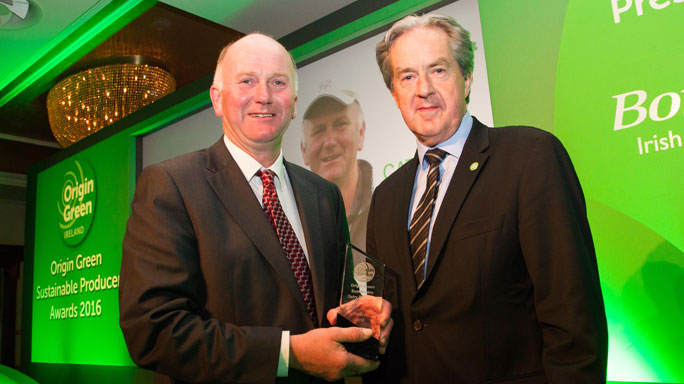Bord Bia Origin Green Sustainable Producer Awards Ceremony

Bord Bia honoured Ireland’s most sustainable farmers at its Origin Green Sustainable Beef and Dairy Producer Awards ceremony.
Glanbia Ingredients Ireland was represented by dairy supplier Michael Power from Urlingford, Co Kilkenny at the awards. Michael was a very worthy winner in the Carbon Footprint Reduction Category, having achieved a substantial improvement in reducing the Carbon Footprint between 2014 and 2016 in his Dairy Enterprise. He achieved this by driving herd performance - cow numbers increased by 40% over two seasons, averaging 538kg MS/cow and on target to produce 550kg MS/cow this year. He also achieved an EBI of €181 with breeding now a major focus as well as kg milk solids.
Steps to take to follow in Michaels Footsteps and reduce the carbon footprint of your Dairy Farm:
- Extend grazing- it is estimated that with every 10-day increase of grazing season there is a reduction of 1.7% ( Greenhouse Gases) and profitability is boosted by €27/cow.
- Improved EBI- improved fertility, production performance and cow health will bring a huge positive improvement to farm efficiency and profitability. The target should be to increase your herd EBI by at least €10/Ha.
- Nitrogen efficiency - a reduction in Nitrogen fertilizer of 10kg per Ha will reduce GHG emissions by 1% and improve income by €10 / Ha.
- Slurry management- a 20% shift to spring application can reduce GHG emissions by 1.3%, by improving soil fertility and grass growth, while a shift to using a trailer shoe can reduce GHGs by 0.9%.
- Improving energy efficiency - it is estimated for a 100 cow herd that incorporating the following tools; improved cooling efficiency by a plate cooler, night rate electricity, energy efficient lights, variable speed milk pump, changing the water heating system to gas or oil could significantly reduce your power bill and hence reduce GHGs.
Other ways you can reduce your Carbon Footprint include:
- Proactive animal health
- Fuel efficiency
- Age at first calving
- Improving soil fertility in a planned manner. For example, soil sampling and prevention of soil compaction
- Cultivating and improving hedgerows and planting trees provide a carbon sink and provide biodiversity
- Recycle farm waste
- Dispose of waste plastic and containers to designated site
If you need assistance with redusing the Carbon Footprint of your farm please contact Anne Browne 087 2473725 or any member of the farm sustainability team 058 51101.
First Published 2 December 2016
